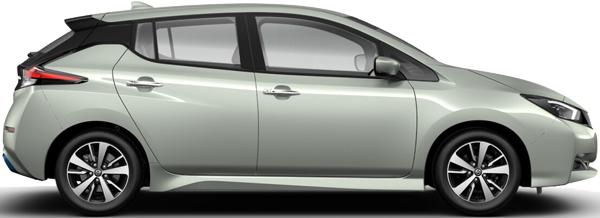The Comparative Analysis :
Nissan Leaf 40 kWh (18 - ..) vs. Hyundai i30 1.6 CRDi Automatic (12 - 15)
€ 35,600

€ 25,900

€ 35,600
Base Price ⓘBase price of a new vehicle with standard equipment in Germany at market launch.
€ 25,900
ⓘBase price of a new vehicle with standard equipment in Germany at market launch. Price Info
Vehicle Dimensions
The Nissan Leaf (40 kWh) is considerably bigger in every dimension. It's 7.5 inches longer, 0.3 inches wider and 2.4 inches taller than the Hyundai i30 1.6 CRDi.
Nissan Leaf (40 kWh)
Hyundai i30 1.6 CRDi
60.2
70.4
79.9
57.9
70.1
80.7
70.4 in
Width
70.1 in
79.9 in
Width Incl. Mirrors
80.7 in
60.2 in
Height
57.9 in
106.3
176.8
104.3
169.3
176.8 in
Length
169.3 in
106.3 in
Wheelbase
104.3 in
Vehicle Weight
Nissan Leaf (40 kWh)
Hyundai i30 1.6 CRDi
3483 lb
Curb Weight
3053 lb
4398 lb
Gross Vehicle
Weight
Weight
4277 lb

Weight Difference:
430 lb
12.34 %

General
Nissan Leaf (40 kWh)
Hyundai i30 1.6 CRDi
ZE1
Generation
GD/GDH
Hatchback
Car Body Style
Hatchback
Electricity
Fuel Type
Diesel

Front-wheel drive
Drivetrain
Front-wheel drive

1-speed automatic transmission
Transmission
6-speed automatic transmission
Engine
Nissan Leaf (40 kWh)
Hyundai i30 1.6 CRDi
Electrically excited synchronous motor
Engine Type
Straight-four diesel engine with turbocharger
0
Valves
4
0
Cylinders
4
0 L / 0 cu in
Displacement
1.6 L / 78 cu in
148 hp
at 0 rpm
Power
126 hp
at 4000 rpm
Nissan Leaf (40 kWh)
148 hp
126 hp
Hyundai i30 1.6 CRDi
236 lb‑ft
at 0 rpm
Max. Torque
192 lb‑ft
at 1900 rpm
Nissan Leaf (40 kWh)
236 lb‑ft
192 lb‑ft
Hyundai i30 1.6 CRDi
Performance
Nissan Leaf (40 kWh)
Hyundai i30 1.6 CRDi
89 mph
Maximum Speed
116 mph
7.9 sec
Acceleration 0 to 62 mph
11.7 sec
62 mph
62
mph
mph
361 ft
0.000 sec

Nissan Leaf (40 kWh)
62 mph
62
mph
mph
535 ft
0.000 sec

Hyundai i30 1.6 CRDi
▶ REPLAY
23.53 lb/hp
Weight-to-Power Ratio
24.23 lb/hp
Nissan Leaf (40 kWh)
23.53 lb/hp
24.23 lb/hp
Hyundai i30 1.6 CRDi
Fuel Economy / Emissions
Nissan Leaf (40 kWh)
Hyundai i30 1.6 CRDi
Fuel Economy
24 kWh✽
( 136 MPGe ⓘ Miles per gallon gasoline equivalent (MPGe) is a measure of the average distance traveled per unit of energy consumed. MPGe, specified in miles per U.S. gallon, is used to compare the energy consumption of vehicles that use different energy sources.)
combined ✽ per 100 miles
43 mpg
( 48 MPGe ⓘ Miles per gallon gasoline equivalent (MPGe) is a measure of the average distance traveled per unit of energy consumed. MPGe, specified in miles per U.S. gallon, is used to compare the energy consumption of vehicles that use different energy sources.)
Nissan Leaf (40 kWh)
136 MPGe
48 MPGe
Hyundai i30 1.6 CRDi
No data
city
33 mpg
No data
highway
52 mpg
40 kWh
Fuel Tank Capacity
14 gal
163 mi
Range
599 mi
Nissan Leaf (40 kWh)
163 mi
599 mi
Hyundai i30 1.6 CRDi
Environmental Impact
49.4 kWh
Total Energy Consumption
per 100 miles ⓘThe total energy consumption per 100 miles is the amount of energy consumed by a vehicle when burning fuel or using electricity per 100 miles (final energy), and the energy required to produce the appropriate amount of fuel or electricity (primary energy).
per 100 miles ⓘThe total energy consumption per 100 miles is the amount of energy consumed by a vehicle when burning fuel or using electricity per 100 miles (final energy), and the energy required to produce the appropriate amount of fuel or electricity (primary energy).
113.1 kWh
Nissan Leaf (40 kWh)
49.4 kWh
113.1 kWh
Hyundai i30 1.6 CRDi
Elektrofahrzeug
Emission Standard
Euro 5
0 g/mi (WLTP)
CO2 Emissions
233 g/mi (NEFZ)
Practical Convenience
Nissan Leaf (40 kWh)
Hyundai i30 1.6 CRDi
5
Doors
5
5
No. of Seats
5
915 lb
Maximum Payload
1224 lb
11.3 cu ft
Trunk Volume
10.7 cu ft







22.4 cu ft
Cargo Volume (Seats Down)
37.3 cu ft











